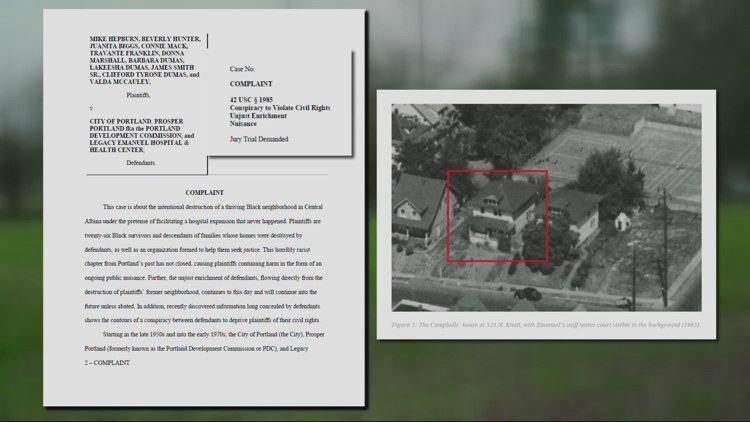Portland City Council Boosts Albina Settlement to $8.5M for Displaced Black Families

The Portland City Council voted to increase a settlement for Black homeowners and descendants of the Albina neighborhood from $2 million to $8.5 million, compensating individuals who claim they were displaced by urban renewal projects dating back to the 1960s, according to a city press release.
The increased settlement was proposed by Councilor Loretta Smith following a mid-session executive meeting, the city said. Councilor Candace Avalos seconded the motion, and the council approved the agreement.
"We have a new council today. We have new ears. We have new eyes. And our response must be deliberate, comprehensive, and rooted in fairness and justice," Smith said during the meeting, according to the city. "I urge each of us to consider, 'How can justice be adequately and appropriately quantified, and what measures can we implement to prevent future displacements?' So, our collective responsibility is clear: to advance efforts toward community recovery and healing and to pursue restorative justice that lays the groundwork for a more equitable Portland for everyone."
The original $2 million agreement, reached in May 2025, was negotiated with 26 Black residents and descendants from the Central Albina neighborhood, the city said in a previous press release . The settlement acknowledges what the city calls "Portland's systemic discrimination and displacement harmed Black communities, by excluding them from homeownership and wealth-building opportunities; by denying them access to educational resources, jobs and healthy neighborhoods; and by perpetuating segregation, displacement, and harmful stereotypes through the zoning code, deeds and covenants, lending practices, public housing and urban renewal," according to the May settlement agreement .
RELATED: Portland reaches settlement agreement with displaced families of Central Albina
In 2022, the plaintiffs filed a federal civil rights lawsuit in U.S. District Court against the city, Prosper Portland and Legacy Emanuel Hospital seeking damages they claim arose from urban renewal projects that displaced Black households from Central Albina through the 1970s, according to previous city statements.
"This settlement marks another step in Portland's commitment to make sure future development bears no resemblance to decisions made 50-plus years ago," Mayor Keith Wilson said in the May press release. "As we reflect on past harms, it's equally important to reaffirm our commitment to development that makes our city stronger, more inclusive and more welcoming."
Albina residents were displaced by the construction of Interstate 5 and the Memorial Coliseum, according to previous KGW reporting. Legacy Emanuel also displaced families through a planned expansion , then left much of the property undeveloped, KGW reported.
'CULTURAL HUB OF BLACKNESS' : Once home to a thriving Black community, Portland's Albina neighborhood is on a slow road to healing
The original settlement terms included provisions beyond monetary compensation, according to the city's May press release. If Keller Auditorium is renovated, the city will provide space for plaintiffs to mount a display. The Keller Auditorium, formerly Portland Civic Auditorium, is named for Richard B. Keller. The neighboring Ira Keller Fountain is named for the former chair of the Portland Development Commission, who oversaw urban renewal projects from the 1950s through the 1970s, the city said.
The city will include at least two displaced families' descendants on any design committee for Keller Auditorium and provide displaced families' descendants with a 10-year hiring preference for city-directed hiring at Keller Auditorium, according to the settlement terms.
For at least five years, the city will declare an annual Descendants' Day and will promote associated community events, the city said. For at least 10 years, the city and Prosper Portland will provide letters of support for any grant-funded documentary about Central Albina.
RELATED: Rare KGW footage of Albina childhood friends revives pride, pain, and hope for Portland's Black community
Plaintiffs have the opportunity to perform due diligence and potentially acquire up to two undeveloped lots in the area from Prosper Portland at no cost, according to the settlement. Prosper Portland will provide use of the Martin Luther King Jr. Heritage Marker site for up to three days, four times per year to the plaintiffs for community events at no cost.
The City of Portland is self-insured for liabilities of this nature, and the cost will be allocated across all bureaus, the city said in its latest press release. The city's Budget Office will assess financial options and explore potential pathways forward.
The city says this agreement places Portland among the first cities in the United States to resolve a legal claim that holds public agencies accountable for the discriminatory impact of past development practices. Last year, the City of Palm Springs, Calif., settled claims by Black and Latino families who said they were displaced during the 1960s.
Legacy Emanuel Hospital settled its portion of the suit in late 2024, with the court dismissing them as a party to the case in January 2025, according to the city's May press release.
KGW reached out to all parties involved in the lawsuit for comment and is currently awaiting responses.
Post a Comment